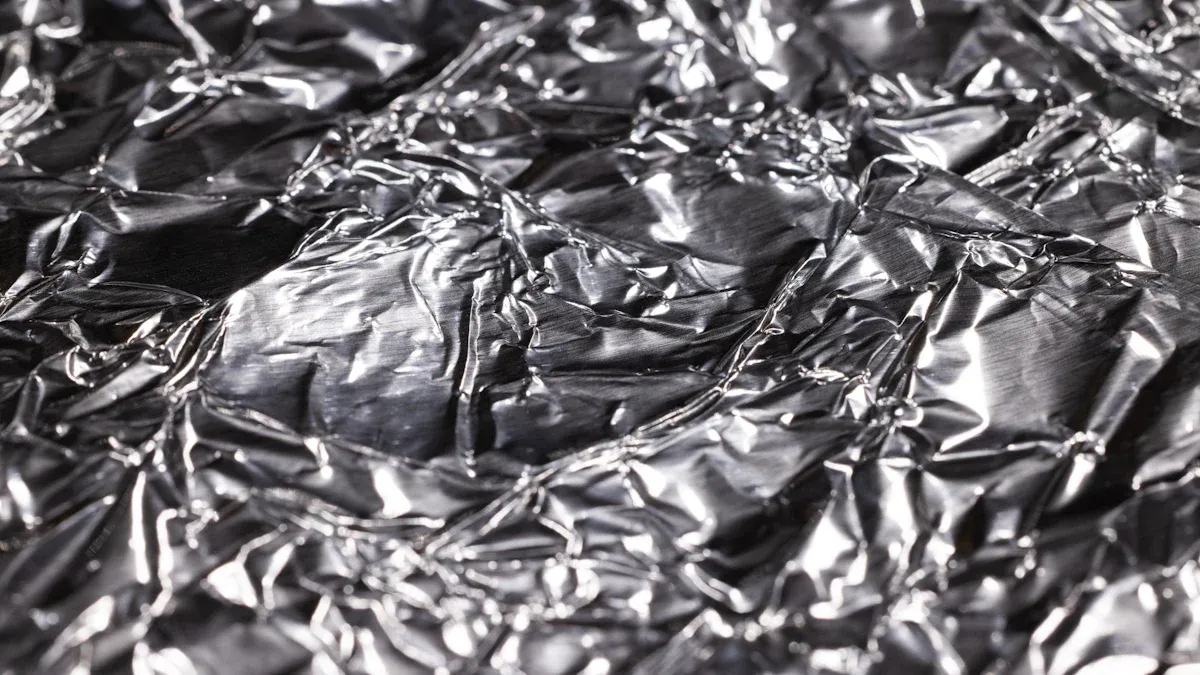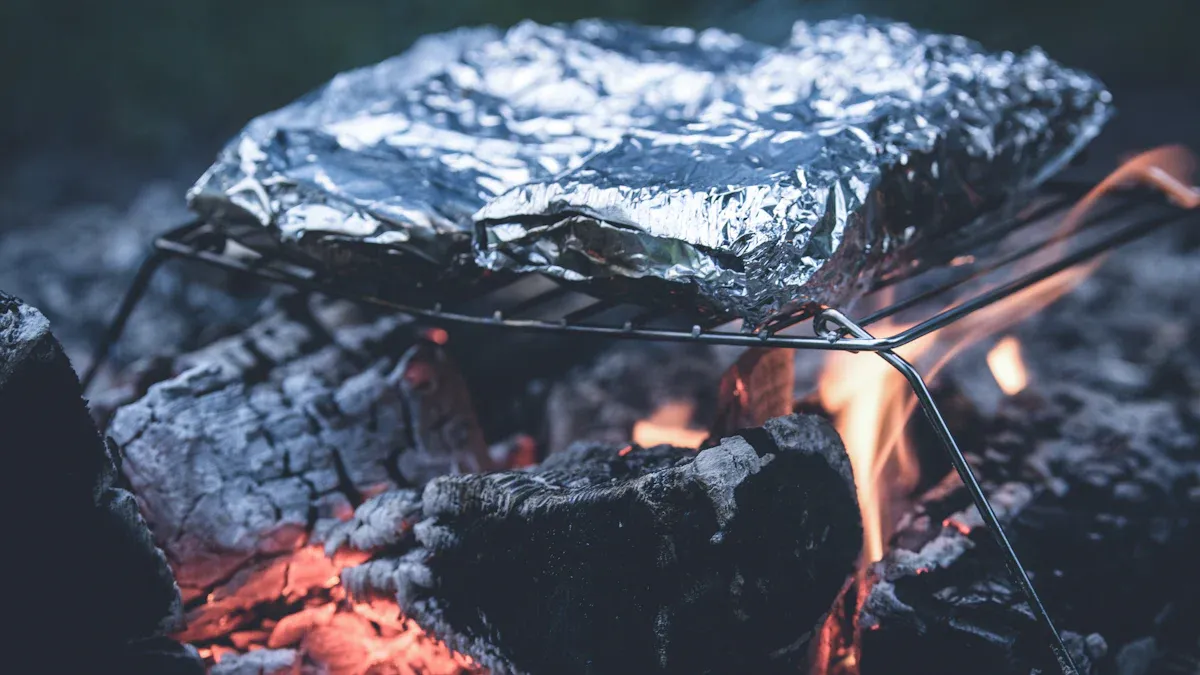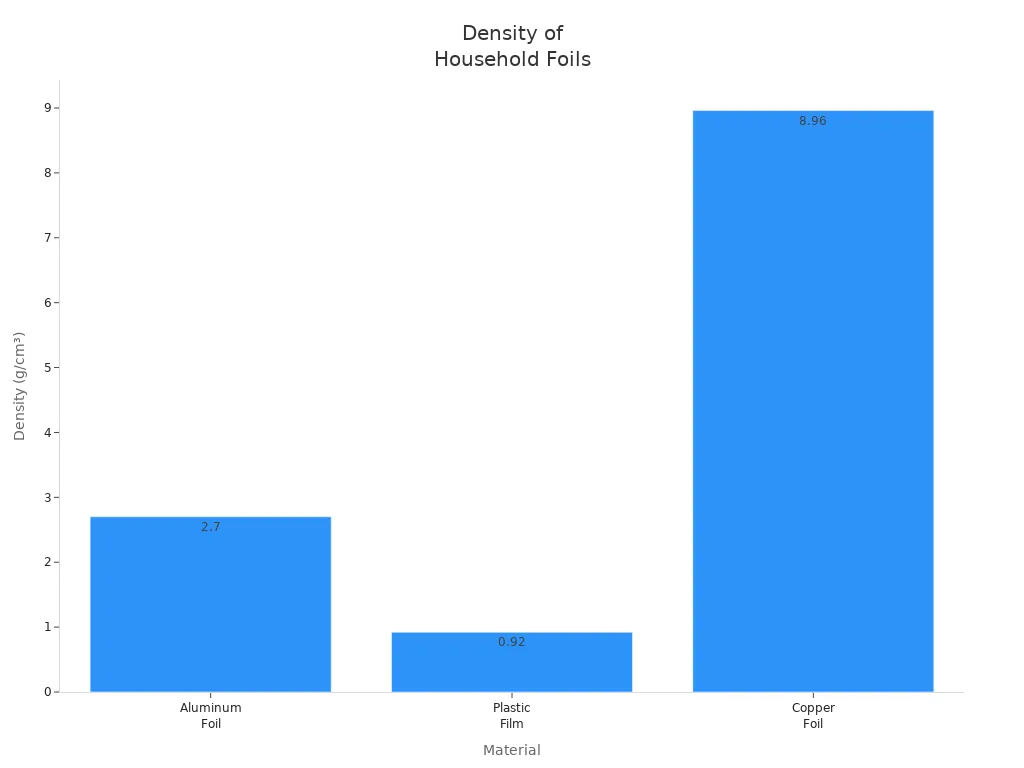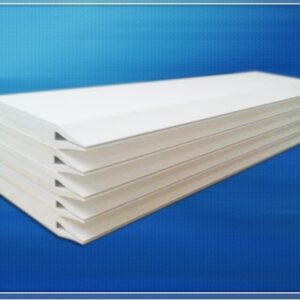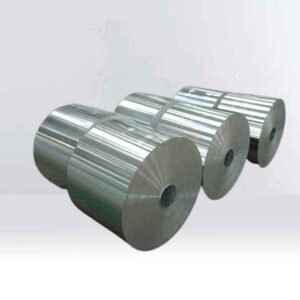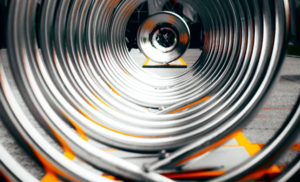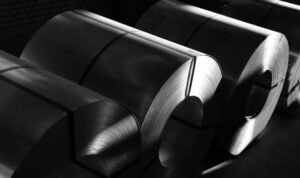If you compare aluminum foil and tin foil, tin foil is much denser. This difference shows up when you use foil for cooking or storing food. Tin foil feels heavier and less flexible because it packs more mass into the same space. Take a look at this table:
| Material | Density (g/cm³) | Thickness (mm) |
|---|---|---|
| Aluminum Foil | 2.70 | 0.012 – 0.020 |
| Tin Foil | 7.31 | 0.025 or more |
You might notice that the mass of aluminum foil makes it easier to wrap around food and shape to containers. If you want something sturdy, tin foil offers more strength, but aluminum foil bends and folds with less effort.
Key Takeaways
- Aluminum foil is lighter than tin foil. It is also more flexible. This makes it good for wrapping food. It works well for covering dishes too.
- Aluminum foil bends easily because of its density. This helps make tight seals around food. Tight seals keep food fresh.
- Thick aluminum foil is stronger. It is good for baking and grilling. Thin foil is better for daily use.
- Pick foil by looking at its density and thickness. Match the foil to your cooking needs. This gives the best results.
- Tin foil is denser and stronger. But it is not as flexible. This makes it harder to use for daily kitchen tasks.
Density of Aluminum Foil
What Is the Density of Aluminum Foil?
You might ask, what is the density of aluminum foil? Aluminum foil has a density between 2.63 and 2.68 grams per cubic centimeter. This makes aluminum foil much lighter than tin foil. When you look at aluminum density, it is lower than most other kitchen metals. The density of aluminum foil changes with the alloy and thickness. Most kitchen aluminum foil uses alloys that keep the density low. This helps make aluminum foil easy to use.
Aluminum foil’s density makes it great for wrapping food or covering dishes. You can bend and shape it easily. Because aluminum is light, you can use it for many things without adding much weight.
Why Density Matters
Aluminum foil’s density affects how you use it every day. The density gives aluminum foil a mix of strength and flexibility. Thin foil is more flexible but can tear quickly. Thick foil has more density, so it is stronger and lasts longer.
- Thin foil bends easily and is simple to shape, but it tears and does not protect as well.
- Thick foil is stronger and lasts longer, so it works for tougher jobs.
When you pick foil for cooking or storage, think about aluminum’s density. Aluminum foil’s density lets you wrap sandwiches, cover pans, or freeze leftovers easily. Aluminum’s low density helps you shape foil around anything. You get foil that bends and folds without breaking. The density also means you can use aluminum foil for light or heavy jobs.
If you want foil that is easy to use and strong for most kitchen tasks, aluminum foil’s density is just right. You can count on its light weight and flexibility for cooking and storage every day.
Mass of Aluminum Foil vs. Tin Foil
Comparing Mass and Thickness
When you look at the mass of aluminum foil and tin foil, you notice big differences. Aluminum foil feels light in your hand. Tin foil feels heavier and stiffer. You use these foils for different tasks in your kitchen.
- Typical thickness of household aluminum foil ranges from 10 to 20 microns. Most people use sheets that are about 12 microns thick.
- Tin foil usually comes in thicker sheets, often 25 microns or more.
The mass of aluminum foil depends on its thickness. Thinner sheets have less mass and bend easily. Thicker sheets have more mass and resist tearing. You can wrap sandwiches or cover dishes with thin aluminum foil. You use thicker foil for baking or grilling when you need extra strength.
If you want foil that shapes to any container, choose aluminum foil. The mass of aluminum foil makes it flexible and easy to use. Tin foil, with its higher mass, does not bend as well. You might struggle to seal food tightly with tin foil.
Aluminum foil works best for cooking and baking. It conducts heat well and stands up to high temperatures. Tin foil, because of its thickness and lower heat resistance, does not perform as well in modern kitchens. You get better results with aluminum foil when you need to cover pans or wrap food for storage.
You should think about the mass of aluminum foil when you pick foil for your kitchen. Thicker foil gives you more strength, but thinner foil is easier to shape. Tin foil’s extra mass makes it strong, but less practical for everyday cooking.
- Aluminum foil is flexible and durable, making it ideal for cooking and food storage.
- Tin foil is less flexible and harder to seal, so you use it less often for kitchen tasks.
Quick Reference Table
You can use this table to compare the mass of aluminum foil and tin foil by thickness and application:
| Thickness (Microns) | Mass of Aluminum Foil | Mass of Tin Foil | Application Description |
|---|---|---|---|
| 6-10 | Very low | Not available | Delicate food wrapping, small items |
| 12-16 | Low | Not available | General kitchen use, casserole dishes |
| 18-25 | Medium | High | Industrial packaging, chemicals |
| 25+ | High | Very high | Bulk food storage, commercial transport |
You see that the mass of aluminum foil changes with thickness. Thin sheets work for everyday food wrapping. Thick sheets help with baking or grilling. Tin foil, with its higher mass, fits heavy-duty jobs but does not match aluminum foil for flexibility.
Tip: For most kitchen tasks, the mass of aluminum foil gives you the right balance of strength and flexibility. You can wrap, cover, and store food with ease.
Everyday Use Differences
Durability
When you pick foil for your kitchen, you want it to last. You need foil that works for baking, freezing, and wrapping food. The density of aluminum foil helps decide how strong it is. Regular aluminum foil tears faster than heavy-duty foil. Heavy-duty aluminum foil is thicker and has more density. This makes it harder to tear and gives it more strength. Here is a table:
| Property | Standard Aluminum Foil | Heavy Duty Aluminum Foil |
|---|---|---|
| Tear Resistance | Lower | Higher |
| Strength (Tensile) | Lower | Higher |
| Typical Thickness | 0.016 – 0.024 mm | > 0.025 mm |
Aluminum foil almost never leaks when you bake or freeze food. You can wrap meats or cheese and keep them fresh for days. The density of aluminum foil helps stop freezer burn and keeps food safe. Tin foil is stronger because it is denser, but people do not use it much now.
- Aluminum foil’s density makes it good for most kitchen jobs.
- Thicker foil is better for baking and freezing because it lasts longer.
Flexibility
You want foil that bends and shapes around food. Aluminum foil’s density gives it great flexibility. You can wrap sandwiches or cover bowls with it. It molds around odd shapes and forms a tight seal. Tin foil is denser, so it does not bend as well.
- Aluminum foil bends to fit any shape, like bread or dishes.
- You can make a tight seal to keep food fresh.
- Its density lets you mold it without breaking.
If you want to wrap food well, aluminum foil’s density and flexibility are best.
Food Storage and Cooking
You use foil for baking, grilling, and freezing food. The density of aluminum foil changes how it works. Thin foil is easy to shape but can tear fast. Thick foil is denser and stands up to heat and long cooking. Here is a table:
| Thickness Category | Uses in Cooking and Storage |
|---|---|
| Standard Duty (0.0006-0.0007 in) | Wrapping sandwiches, covering dishes, light oven use. |
| Heavy-Duty (0.0008-0.001 in) | Lining pans, grilling meats and vegetables, wrapping heavier foods. |
| Extra Heavy-Duty (0.0011-0.0016 in) | High-heat cooking, long baking durations. |
Aluminum foil’s density makes it light and simple to use. It spreads heat well when you bake or grill. The density also blocks moisture and air, so food stays safe from freezer burn. Tin foil is less flexible and not as easy for daily cooking.
Tip: Pick aluminum foil with the right density and thickness for your job. You get strength for baking and flexibility for wrapping.
Other Household Foils
Copper Foil
You might see copper foil in craft projects or electronics. Copper foil feels heavier than aluminum foil. The density of copper is much higher, so you notice the weight when you hold it. Copper foil does not bend as easily as aluminum foil. You get more strength and durability with copper, but less flexibility.
Take a look at this table to compare mass per unit area:
| Material | Density (lbs/cubic inch) | Weight Ratio (Aluminum to Copper) |
|---|---|---|
| Copper | 0.32117 | 1.0 |
| Aluminum | 0.09765 | 0.42 |
Copper foil works well for tasks that need good heat and electrical conductivity. You use it for shielding cables or making art. You do not use copper foil for wrapping food because it is heavy and less flexible.
Gold Foil
Gold foil stands out because of its high density and softness. You find gold foil in crafts, decorations, or special food presentations. Gold foil feels much heavier than aluminum or copper foil. The density of gold is the highest among common household foils.
Gold foil bends easily, but it tears quickly. You use gold foil for delicate tasks. You do not use it for cooking or storage because it costs more and does not offer much strength.
Comparison Overview
You can compare the densities of these foils in the table below:
| Metal or Alloy | Density (kg/m³) |
|---|---|
| Aluminum | 2712 |
| Copper | 8940 |
| Gold | 19320 |
You see that gold foil is the densest, followed by copper, then aluminum. Tin foil also has a higher density than aluminum. The physical properties of each foil affect how you use them at home.
- Standard household foil thickness is about 0.016 mm.
- Heavy-duty foil is thicker, around 0.024 mm.
- Some foils have non-stick coatings for easy cooking.
- Good conductivity helps reflect heat and light.
If you want flexibility and light weight, choose aluminum foil. For strength and conductivity, copper foil works best. Gold foil gives you a soft touch for crafts, but you do not use it for everyday kitchen tasks.
Tip: Pick the foil that matches your needs. Density and mass change how each foil performs in your home.
You can pick the right foil by checking density and mass. Aluminum foil is good for cooking and storing food. It is light, stands up to heat, and you can recycle it. Copper foil is very strong if you need something tough. Mylar keeps its shape better than aluminum foil, so it is good for flexible jobs.
- Aluminum foil works well for grilling, steaming, and wrapping food.
- Copper foil is the strongest and is used for hard jobs.
- Mylar is best when you want foil that bends and does not tear.
| Material | Density (g/cm³) | Weight for Same Volume | Key Benefits |
|---|---|---|---|
| Aluminum Foil | ~2.70 | Moderate | Lightweight, strong, recyclable |
| Plastic Film | ~0.92 | Very light | Cheap, stretchable, non-heatproof |
| Copper Foil | ~8.96 | Very heavy | High conductivity, expensive |
Tip: Use aluminum foil for most kitchen jobs. Pick copper foil when you need strength. Choose Mylar if you want something flexible. Density and mass help you get the best foil for your home.
FAQ
What makes aluminum foil lighter than tin foil?
You notice aluminum foil feels lighter because it has a lower density. The average density of aluminum is much less than that of tin. This difference helps you handle and shape aluminum foil more easily in your kitchen.
Can you use aluminum foil for all cooking tasks?
You can use aluminum foil for most cooking jobs. It works well for baking, grilling, and wrapping food. Heavy-duty foil gives you more strength for tough tasks. Always check if your recipe needs extra-thick foil for best results.
How does the density of pure aluminum affect foil performance?
The density of pure aluminum is about 2.70 grams per cubic centimeter. This property gives you a foil that is both strong and flexible. You can wrap food tightly and cover dishes without much effort.
Is aluminum foil safe for storing food in the freezer?
You can safely use aluminum foil to store food in the freezer. It blocks air and moisture, which helps prevent freezer burn. For best results, use heavy-duty foil for meats or foods with sharp edges.


